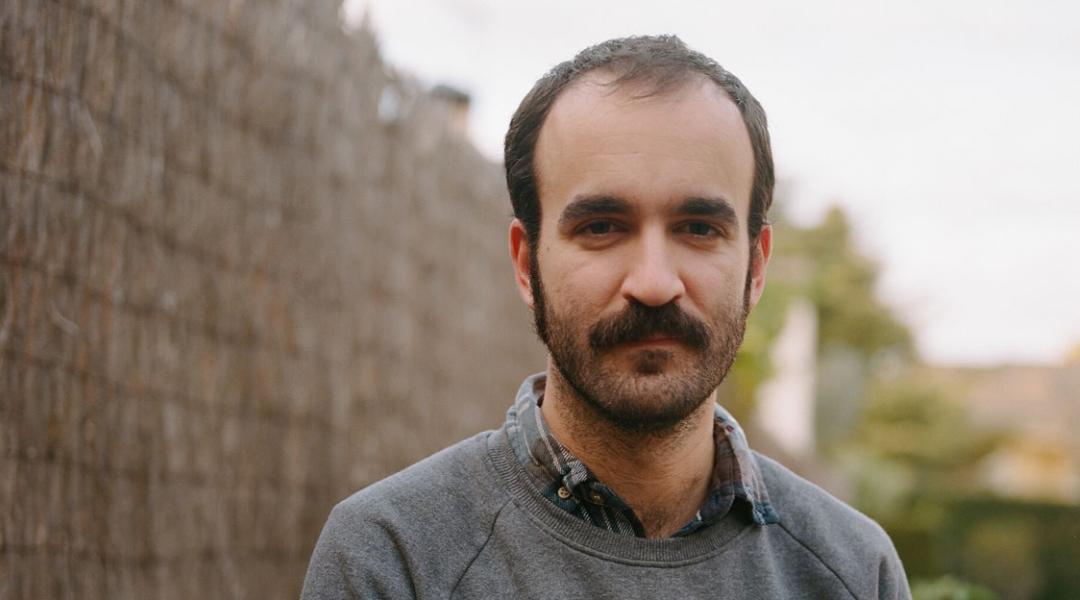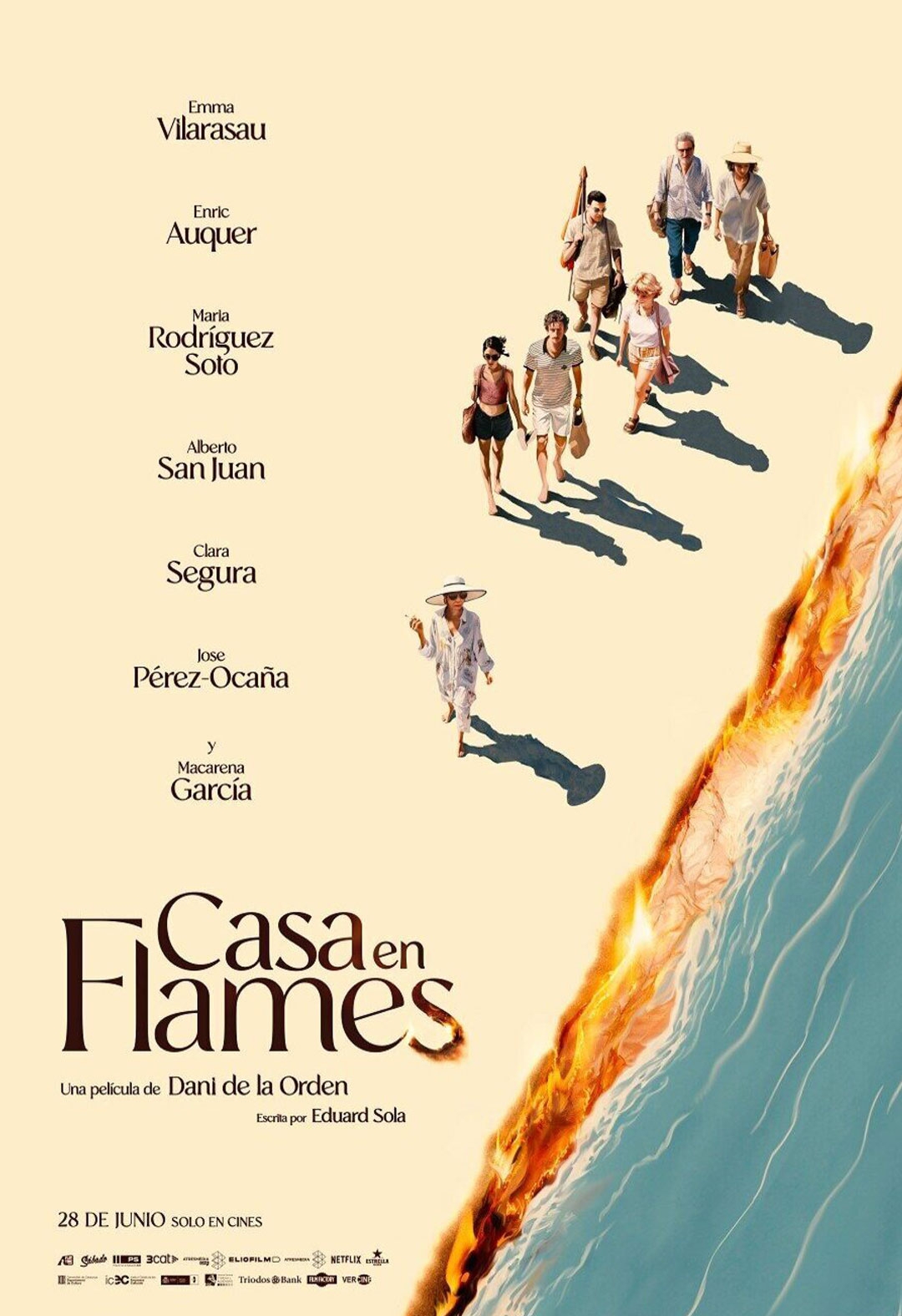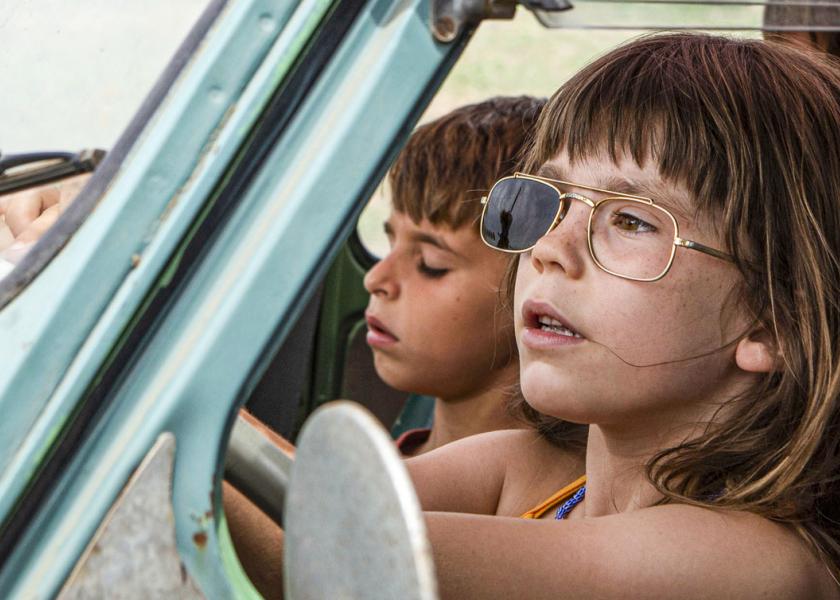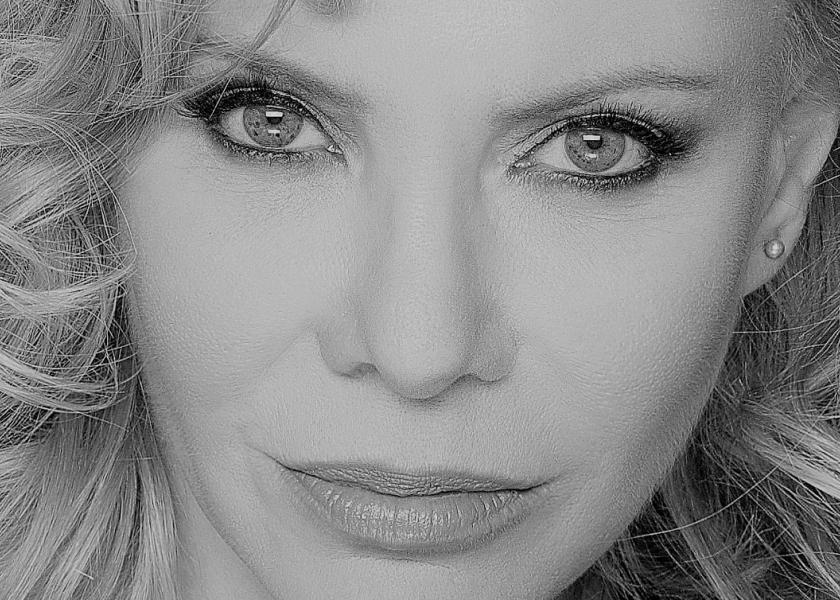Eduard Sola
Profession: screenwriter

Feroz, Gaudí, Goya and… Platino? If he wins it on the 27th of April, Eduard Sola would close an unforgettable awards season with his script for ‘A House on Fire’. “I’m immensely happy,” he admits, and with good reason. A firm advocate of the work of screenwriters as a profession and an admirer of the great Rafael Azcona, he quickly realised that he wasn’t made for directing, but rather for capturing stories on paper.
Inside. IFEMA Palacio Municipal in Madrid - Evening. Eduard Sola (Santa Eulalia de Ronsana, 1989) hears his name and steps onstage to collect the Platino Award for Best Screenplay for A House on Fire. If these lines come true on the 27th of April, this Catalan screenwriter would close a spectacular cycle: Feroz, Gaudí, Goya, and Platino Awards. Also, until now, all his acceptance speeches have gone viral thanks to phrases like “only culture will stop the dehumanisation that is creeping up on us” (Feroz), “if my grandfather was illiterate, and I work in writing it’s because something has happened, it’s called progress” (Gaudí), or “my generation are sons of a multitude of super-mothers” (Goya). When we ask him if he’s got some words ready, he warns us: “I wouldn’t like anyone to think that, if I win the Platino Award, I’m going to give a speech... I might say thank you very much and that’s it. We’ll see, the nerves of the moment will decide.” What he does confess during our chat is which script from the history of cinema he would save in an apocalypse: “Any by Rafael Azcona, but I’d like to specify one...” After much deliberation and mentioning titles like ¡Ay, Carmela! or The Enchanted Forest, Eduard makes a decision: “I’m going to say Butterfly because it’s incredible. That ending has gone down in history!”
As children, we usually dream of becoming astronauts, not screenwriters. In your case, where does that passion for film and storytelling come from?
When I was little, my parents didn’t use to take me to the cinema very often, but I loved it, so my passion comes from that desire. I had a friend who used to go every week, and I thought it was the best. My parents weren’t film buffs and so, I couldn’t be one either. Everything changed with the explosion of DVDs... When I was older, I remember watching the bonus material of The Lord of the Rings—it didn’t exist before, and we didn’t know how films were made—and thinking: “I want to do this.”
Once inside the world of film, you realised that you didn’t want to be a director, just a screenwriter. Why?
When I studied at ESCAC, the Cinema and Audiovisual School of Catalonia, I discovered that I wanted to tell stories through film, but I would rather not be on set. I don’t like that world much. I came to a simple conclusion; I wanted to be a screenwriter, and it was a discovery.
“Thinking that screenwriters are those loners in a dressing gown, with a whisky and cigar in hand, is a mistake because I don’t wear a dressing gown, smoke cigars, or drink whisky”
ESCAC has become a pool for Catalan but also Spanish cinema. What do you think they do well in terms of shaping talent?
I’m not sure if they shape talent... What they do is bring it together. ESCAC generates a team-building ecosystem. Filming is at the centre, and you spend four years with dozens of people who want to make films. You don’t only leave there with knowledge about how to make films, but also with the friendships that will allow you to do so. The first films my generation made were based on that, on friends that get together and say: “Let’s make a film.” That collective impetus was the seed of our careers.
Recently, Juan Diego Botto said this about the writing process: “For me, writing is a tedious thing, it involves many hours and a lot of solitude.” How do you experience it?
My life is far from tedious. I think that Juan Diego, who is also an actor and director, says that because screenwriting is not the centre of his professional activity. The image of the screenwriter who works alone at home has occupied the public imagination, but in reality, I spend a lot of my time in meetings discussing things with people. In the good sense, though (laughs). It’s very sociable. Then you have to bring that to life at home writing, but thinking that screenwriters are those loners in a dressing gown, with a whisky and cigar in hand, is a mistake because I don’t wear a dressing gown, smoke cigars, or drink whisky. In fact, this week I haven’t written a single page, whereas other times I spend whole weeks writing.

‘A House on Fire’ (‘Casa en flames’ is its original Catalan title) invites us to spend a very special weekend in the Costa Brava. © Atresmedia Cine
During this awards season, you have won the Gaudí Award, the Feroz Award, the Goya Award, and soon you could perhaps add the Platino Award to this list. How do you feel?
I’m immensely happy. I also love that this is happening with A House on Fire, a film I have made surrounded by friends and that defends values that I feel comfortable with. Regarding the Platino Awards, it would be the grand finale. The Catalan or Spanish context is different from the Ibero-American setting, so they are very important. It would be very exciting to win! In any case, let’s not forget that any cultural competition is nothing more than a performance. One film isn’t better than another because of winning an award.
“Screenwriters do not demand more awareness because we want to be famous, but rather because we need to value the human being behind each story”
Your speeches after receiving the Gaudí, Feroz and Goya Awards went viral. Do you believe making the most of any outlet is essential? Have you prepared a speech for the Platino Awards?
I don’t think it’s a must, to each their own. I think it’s interesting to add value to an acceptance speech, even if it’s just because the ceremonies get long. Nobody’s interested in me listing all my cousins. I haven’t prepared a speech yet because there’s still a long way to go [this interview is held on the 4th of April]. It’s also true that nerves push me to write. I always think: “What if I win? I don’t want to make a fool of myself!” Even though it might not seem so, I don’t have a big strategy behind each speech.
Screenwriters work behind the scenes, far from the limelight, to the point where the red carpet seems like a no-go zone for you. Do you miss being more visible?
Without a doubt. This awards season has shone a spotlight on me that I don’t deserve and exceeds any expectations, but I am the exception. Screenwriters do not demand more awareness because we want to be famous, but rather because we need to value the human being behind each story. It’s not about boasting, it’s a legitimate issue. It’s surreal to leave the cinema without knowing who has written that story we enjoyed so much.
“A screenwriter has to keep their eyes open to the world because, without that talent, that awareness, it is very hard to draw a true portrait”
Going over your filmography, people could call you a versatile screenwriter. Do you think that’s one of your strong points?
I’m not sure if it’s my strong suit, but it does give me an advantage. If you take the list of the last Goya winners, you have to scroll far down to find the first screenwriter who tells other people’s stories. When the industry finds someone who likes to tell other people’s stories, it gleefully rubs its hands together. When Estíbaliz [Urresola] wins for 20,000 Species of Bees, nobody thinks of calling her because it goes without saying that she’ll continue telling her own stories, not other people’s. However, when I tell you the story of A House on Fire, a story by Dani de la Orden, people pick up the phone. Professionally, for me, this versatility gives me life. I also don’t need to tell my own experience in the world, I’m comfortable keeping things separate.
From your point of view, what’s the main talent a screenwriter should have?
A screenwriter has to keep their eyes open to the world because, without that talent, that awareness, it is very hard to draw a true portrait. That’s even more important than writing well because, if you have that power of observation, you’ll manage to put it down on paper one way or another.


